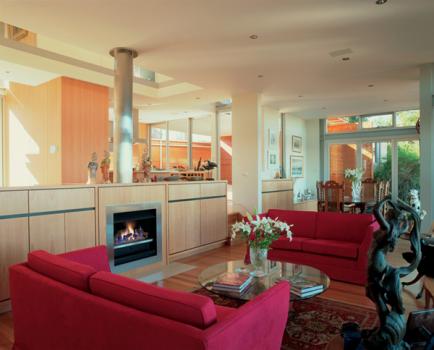
Find out how star ratings for homes relate to how the house is designed from a climate control perspective.
The best and most sensible way to approach climate control in your home is almost always to consult a trained, certified and experienced professional. Depending on whether you’re building from scratch, renovating, or simply making ad hoc improvements, this will mean asking different things of different people. Having the right information is crucial to making informed choices with regards to heating and cooling.

Image courtesy of Jetmaster.
Nationwide Home Energy Rating Scheme (NatHERS)
The Nationwide Home Energy Rating Scheme (or NatHERS) is a scheme under which house designs in Australia are run through software tests and given a star rating in accordance with how potentially energy efficient they will be in terms of heating and cooling. These ratings are assessed differently based on local climate conditions, and range from 0 stars to 10. In theory, a house with 0 stars is completely inefficient, while a 10 star house wouldn’t need any artificial heating or cooling.
Whether you’re buying a home off the plan, building afresh or undertaking large-scale renovations, NatHERS testing is a good measure of how efficient a home’s heating or cooling is likely to be. While the scheme is far from perfect (it doesn’t for example, take into account infiltration), it’s an excellent way to assess the theoretical efficiency of a house design.
Climate control in new homes
If you’re designing from scratch, you’re lucky. Not only because you’ll eventually have a flash new home to move into, but also because you have the freedom to really consider how it will be designed for effective and efficient climate control.
Provided that you know where your home’s going to be located, what the climate’s like there and how much sun and breeze you’re likely to get, you can talk to your architect about passive house design, implementing specific passive heating and cooling techniques, or making use of sustainable fuel sources like geothermal or solar heat.
In most cases, a good architect or building designer will take these things into account anyway – especially if you’re building in a particularly hot or cold area, and particularly if you make a point of wanting to design for efficient and effective climate control. The types of things that will make a difference are:
- the materials that are used (and their thermal mass)
- the orientation of your home
- window glazing, orientation and size
- what technologies are used for heating, cooling and ventilation
- insulation
Designing for highly effective climate control doesn’t need to be vastly more expensive. Provided that you brief your architect on what you need (and that he or she knows your budget!), chances are you’ll end up with a very efficient home.
Existing designs
If you’re buying a home based on an existing design, you’ll have limited choices as far as climate control’s concerned. Different homes are designed differently though, so it pays to shop around and talk to different builders. Homes in Australia are built to specific energy efficiency standards, and most pre-designed homes will include a NatHERS rating which will give you an idea of how efficient they are.
Major renovations
Climate control should be a big consideration in any major renovation – additions to your home can serve to either dramatically improve or reduce your home’s heating and cooling efficiency. Research and discuss your options with an architect or your builder for a better idea of what the changes are likely to involve.
Ad hoc improvements
If you’re simply unsatisfied with the heating and cooling in your home the way it is, your first real step is to figure out where the problem is. Do you have an infiltration problem? A lack of insulation? Could it be that your windows are letting too much heat in or out? Adding heaters and cooling technologies to your home is an obvious way to improve things, but it’s not always the best way. If you already have a heater or air conditioner, consider talking to a climate control expert about how to improve climate control in your home.





